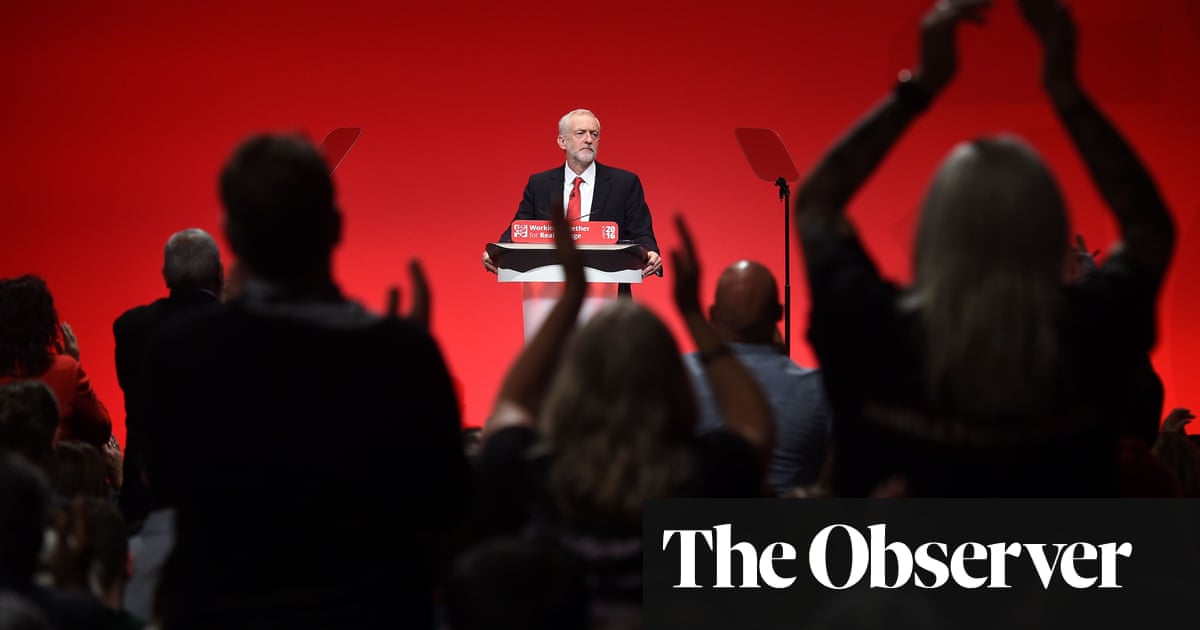
After Labour’s NEC passed a motion last week preventing Jeremy Corbyn from standing as a Labour candidate in Islington North, the party’s former leader put out a statement which said: “I will not be intimidated into silence. I have spent my life fighting for a fairer society on behalf of the people of Islington North, and I have no intention of stopping now.”
The implication seemed to be that he would stand as an independent at the next general election, thus setting up a dramatic ideological battle between Keir Starmer’s party machine and the hard left rallying around arguably its most successful leader in British history. Apart from the political spectacle, that scenario creates a crisis of conscience for many Labour members in the constituency that Corbyn has represented for 40 years.
As one local councillor puts it: “I’m in a lot of pain. He’s an Islingtonian. It’s community against party. It’s going to put a lot of people in a very bad predicament.”
Those around Corbyn say he hasn’t in fact made a decision - he was on holiday in Mexico last week, no doubt weighing up his options. It’s thought his wife would like to see him retire from the parliamentary fray, but perhaps of equal or even greater importance are the consultations he will hold with local party members. As things stand, those close to him sense that he is leaning towards making a stand.
“Being chased off the pitch is worse than being beaten on the pitch,” says one Corbyn loyalist. “And getting a win would feel positive and worthwhile.”
One kind of stand, as another Islington councillor puts it, is for Corbyn “to carry on sitting on his hands”. This councillor speaks of three sections of local Labour members – diehard Corbynites on one side and those who want him out on the other, and in between a large group of the undecided who have strong feelings of loyalty towards someone who has been a hardworking local MP for four decades. “If he makes a move,” says the councillor, “quite a lot of that middle group will side with the Labour party. Perhaps not enthusiastically, but they will back the official candidate.”
The selection process is not due to take place any time soon and it’s possible that the constituency party will insist that the sitting MP is their preferred candidate, which will put it on a collision course with the central party. “My hunch,” says the local councillor, “is that somewhere along the line the constituency party will get suspended and the National Executive Committee will take over the selection process.”
Corbyn’s friends and supporters all express outrage at Starmer’s decision, which the NEC endorsed, complaining that the Labour leader is not only much more ruthless than Corbyn was when he had the reins of power, but also more uncompromising than their great bete noire Tony Blair. They put this down to the “establishment” fear inspired by Corbyn’s unlikely journey from backbench obscurity to the party leadership, coming within shooting distance of power in 2017. “It’s Starmer trying to make the party safe again for the ruling class,” as one put it.
A defining characteristic of the Corbynites is that they use terms like the “ruling class” and the “establishment” without hesitation or apology. By contrast, for Starmer and his supporters, “ruling” is the key word, and they argue that Corbyn is electoral kryptonite. Although Corbyn lost the party whip (he sits in parliament as an independent) for claiming that the scale of antisemitism in the party had been overstated for political reasons, the motion against him specified that the party’s electoral prospects would be “significantly diminished” if Corbyn were endorsed.
Luke Akehurst is a longtime anti-Corbynite and an NEC member who voted for the motion. “The 2019 result was an unmitigated disaster,” he says, “the worst result for Labour since 1935, losing many historic heartland seats. As for 2017, the Corbynites like to claim Corbyn came close to winning. He didn’t. Corbyn’s electoral strategy of appealing to our core vote meant we piled up huge majorities in inner city and university seats and made very little progress in the marginal towns and suburbs where first-past-the-post elections are won and lost.”
In tactical terms of trying to stick the hard left genie back in its bottle, Starmer’s manoeuvre is well-calculated. If Corbyn doesn’t stand, he is out of parliamentary politics and the Labour regime can consign him safely to history, bar the occasional star turn at demonstrations. If he does stand, and loses, it’s a similar outcome but with the added bonus of popular endorsement. And even if he stands and wins, he’s no longer a Labour MP, and therefore can’t affect the Labour brand.
Jon Lansman, who set up Momentum, the leftwing grassroots movement that supported Corbyn, has accused Starmer of behaving like Vladimir Putin, but nonetheless he doesn’t want to see Corbyn stand again. He suggests that he follow the example of Corbyn’s hero, Tony Benn, and “retire from parliament … to devote more time to politics”.
“We have to move on from the Corbyn era,” he says. “We’ve got to focus on the future and the future is not really about Jeremy Corbyn and Islington North.”
To those centrists who felt endangered during the radical surge of Corbynism, this purge demonstrates that the Labour party is no longer a safe space for a certain strand of the far left. Anyone now in the party who offers support to Corbyn will effectively be organising their own expulsion. As Starmer himself said: “If you don’t like that … I say the door is open and you can leave.”
But could it all backfire on Starmer? Could he have triggered a toxic factional battle and made Corbyn a martyr around which the beleaguered left can rally? If Corbyn’s last stand is to carry any greater political significance than personal vindication, he will first have to win the seat. History tells us that standing against a party seeking to replace a deeply unpopular government is hard to do. History, however, doesn’t have any examples of former leaders with huge local appeal and 40 years’ representation being forced out of their party.
It’s not hard to find Corbyn supporters in Islington North. On Highbury Park I ask Kim Longinotto about her local MP. “I love him,” she says, sounding more like a worshipper than a supporter. “I’d do anything for him. All my friends feel the same. God, I really hope he can win.”
In my tiny straw poll of 10 passersby, the results are 50-50, though it’s notable that a number of those who say they would stay loyal to Labour express a personal appreciation for Corbyn. As Cheryl Pelteret says: “I like him, but I don’t think he’s helped the Labour party. I think he cost us a lot of valuable years.”
What people say is one thing; it’s another getting the vote out, which is where party machines really come into their own. In these days of digital storage, political parties possess a great deal of data about voters. In Islington it goes back to 1997, draws on canvassing returns and enables what’s known as differential turnout analysis, which is critical to any contemporary election campaign.
“That’s Labour party data which could easily be slipped to Jeremy’s putative campaign,” says the councillor, although there is no suggestion that such an act would be countenanced by Corbyn.
If Labour has the advantage of party machinery, Corbyn will be able to call on an army of canvassers. Some 200,000 members are said to have left the party since he resigned as leader (more than 150,000 are also said to have joined), creating what a Starmer insider calls “an extraordinary change in membership composition”. If only a tiny fraction of those disaffected ex-members volunteered, the constituency, as someone in the Corbyn camp says, would be “flooded”.
“Were Jeremy to stand,” says another, “there would be more people canvassing in Islington North than any other constituency in the country.” Whether that volunteer influx would alienate as much as it would aid is open to question.
Another question is: who would Corbyn stand for? His Peace and Justice movement, perhaps, or some left unity coalition? The word from his camp is that there will be no attempt to set up a new party, which in a first-past-the-post system is seen as a one-way ticket to the parliamentary wastelands. Those cautioning against a Corbyn ticket agree.
“A new party is just not credible,” says Lansman. “That’s why I think Jeremy doesn’t have a strategy. He never had a strategy – he never wanted to be leader. Jeremy spent all of his life as a backbencher, which is what he wants to be again, giving all his support to organisations and causes that he believed in.” But I don’t know that there’s a long track record of things you can point to that he has achieved, because backbenchers don’t achieve much”
Nor will a defiant Corbyn inspire many Labour MPs to leave the party, any more than Corbyn himself quit when Militant-supporting MPs Dave Nellist and Terry Fields were deselected as Labour candidates in 1992. There is a hope that if Labour wins as a minority government or with a small majority, left-leaning MPs will be able to exert disproportionate influence. One prominent Corbynite dismisses this as empty thinking that only provides further justification for purges of the left.
There is instead much higher-ground talk of global “systemic crisis”, economic meltdown and climate change coming from the Corbyn camp and that, regardless of whether their man stands or not, these are the issues around which the left must continue to organise.
Meanwhile Islington North finds itself the battleground in a half-declared struggle for the soul of the Labour party. Almost everyone agrees that it has to be a broad church, but Starmer is going to insist on the same hymn sheet. Often characterised as the last word in middle-class gentrification, North Islington actually has the eighth highest concentration of social housing of the UK’s 650 constituencies. And there were signs with the low turnout at the local elections last year that working-class voters, traditionally a local Labour mainstay, are losing faith in the party.
A theatrical sideshow featuring an intransigent 73-year-old and a heavy-handed central party is unlikely to be the most effective means of winning them back. The local councillor says that how this story plays out will have a lot to do with how the party organises the selection process. If they parachute in a candidate with little local appeal, they could have a revolt on their hands. But anyone with local cachet may have to risk it by going up against what one local calls “an Islington political legend”.
Either way, Corbynism as a political force appears to be dead and buried, but Corbyn the politician is fighting on – at least in Islington North.












